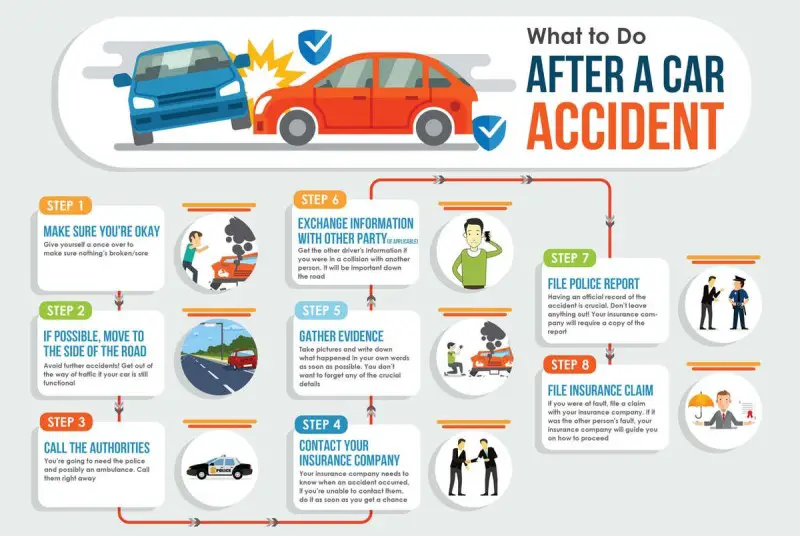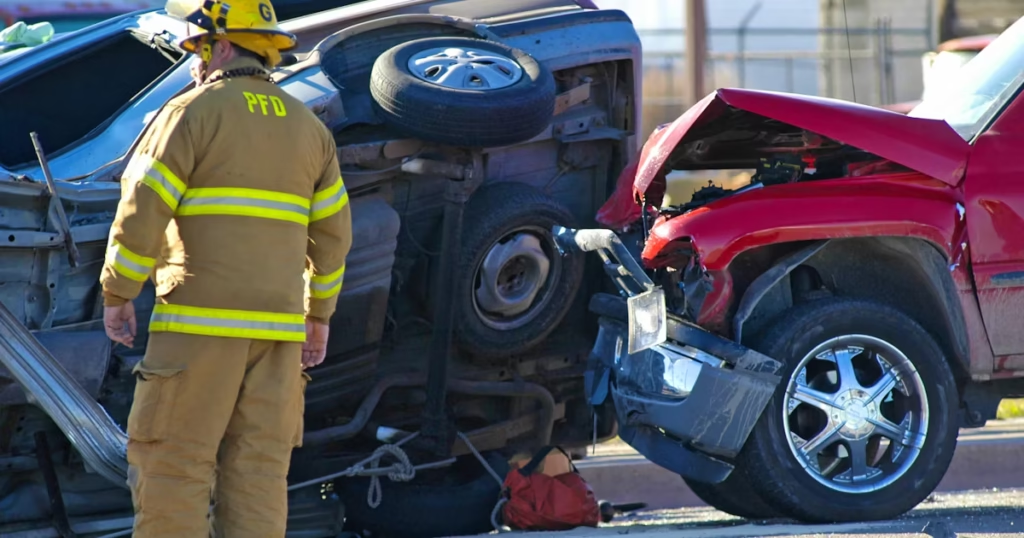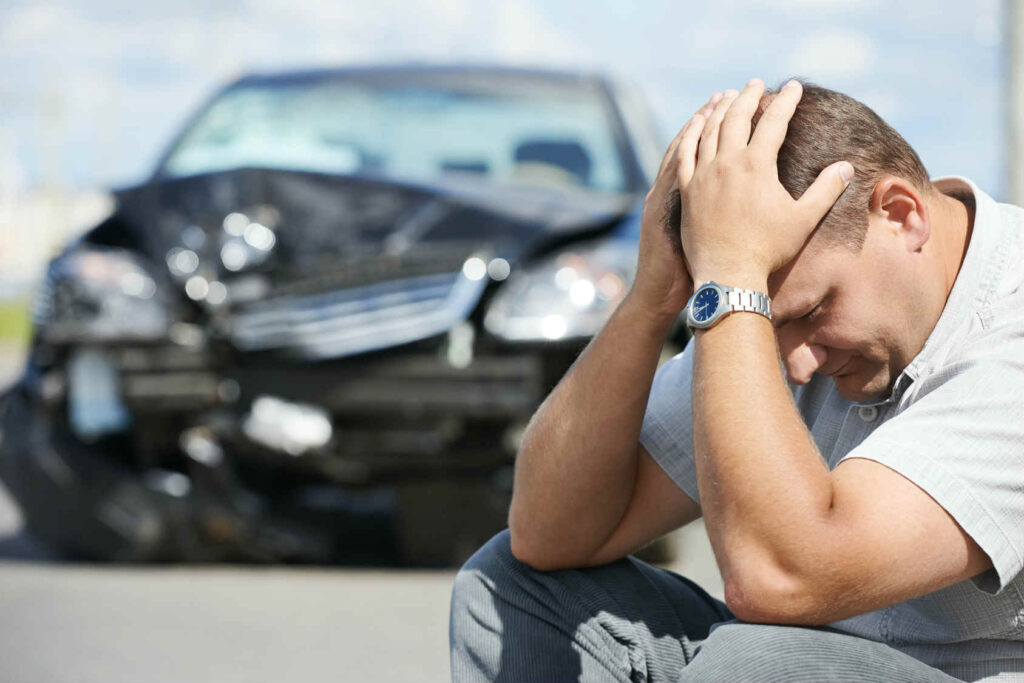Car accidents suck. They’re sudden, chaotic, and painful—both physically and emotionally. One second you’re on your way to get coffee, the next you’re trying to remember your license plate number while holding your neck in pain. So what the heck do you do after it happens?
Let’s break it down step-by-step, in plain English, so you can protect your health, your wallet, and your legal rights.

1. First Things First: Safety Comes Before Everything
Check Yourself and Others for Injuries
Before you even think about your car or insurance, check yourself. Can you move? Are you bleeding? In pain? If you’re okay, check on anyone else involved—passengers, the other driver, even pedestrians.
Get to a Safe Spot
If you’re able to move, get to the side of the road. A second accident won’t help anyone. Turn on hazard lights. Set up flares if you have them.
2. Call 911: Don’t Hesitate
Why Police Reports Matter
Even for “minor” accidents, having an official police report can be a lifesaver down the road—especially if injuries pop up later or someone decides to play the blame game.
What to Say When You Call
Stick to the facts:
- Where are you?
- How many people are hurt?
- Are there any dangers (like a leaking gas tank)?
Don’t admit fault. Just report what happened.
3. Gather Evidence Like a Detective
Photos, Videos, and Witness Statements
Think like you’re building a case—because you might be. Take pics of:
- Vehicle damage
- Skid marks
- Road signs
- Injuries
Ask any witnesses for contact info and a quick description of what they saw.
Grab the Other Driver’s Info
Exchange:
- Name
- License number
- Insurance company
- Plate number
Keep the convo short and polite. No arguing.
4. Don’t Just “Walk It Off”—Get Medical Attention
Why You Might Feel Fine (But Aren’t)
Here’s the thing: adrenaline is sneaky. It masks pain. That “I’m fine” feeling? It might wear off in hours or even days. You could have whiplash, internal bleeding, or a concussion.
Go to the ER or Urgent Care
Even if it feels like overkill—go. A medical record right after the crash can support your injury claim and catch things before they get worse.
5. Notify Your Insurance Company (But Choose Your Words Wisely)
What to Share—and What Not To
Yes, tell them what happened. But keep it short:
- Date and time
- Location
- Names of those involved
Avoid phrases like “I’m fine” or “It was my fault.” Let the facts—and maybe your lawyer—do the talking.
6. Document Everything Like Your Case Depends on It—Because It Might
Start a folder (digital or physical) with:
- Medical bills
- Car repair invoices
- Prescriptions
- Missed work logs
- Pain journal entries
You’ll thank yourself later if a lawsuit or settlement comes up.
7. Don’t Talk to the Other Driver’s Insurance Without Legal Advice
They’re not your friend. Their goal? Pay you as little as possible. Let your attorney (or at least your own insurance) handle those calls.

8. Consider Hiring a Personal Injury Attorney
When It’s Time to Lawyer Up
If your injuries are more than minor scrapes, or you’re facing time off work or big medical bills, get a lawyer involved. Most offer free consultations.
How Attorneys Get Paid (Spoiler: It’s Usually Free Up Front)
Most work on contingency—meaning they only get paid if you do. No win? No fee. That’s less stress on your end.
9. Focus on Healing, Not Just Hustling
This is your body we’re talking about. Don’t skip follow-up appointments. Don’t push yourself back to work too early. You’re not lazy—you’re recovering from trauma.

10. Track Your Expenses and Losses
Car accident injuries can get expensive fast:
- Lost wages
- Therapy
- Medications
- Travel to appointments
Keep receipts. Every penny counts when it’s time to settle.
11. Be Careful on Social Media
Posting a gym selfie or dancing TikTok after a crash? Bad idea. Insurance adjusters do stalk your socials. Don’t give them ammo to downplay your injury.
12. Follow Up on Medical Treatment
Finish that physical therapy. Get the follow-up scan. Insurance companies love to argue, “If you were really hurt, you would’ve kept treating.” Beat them at their own game.
13. Know the Statute of Limitations in Your State
Each state has a deadline for filing injury claims. Some as short as one year. Miss it, and you’re out of luck—no matter how solid your case is.
14. Don’t Settle Too Early
That fast settlement check may look tempting—until the back pain kicks in three weeks later. Once you sign, that’s it. No do-overs. Wait until you know the full picture.
15. Final Thoughts: You’ve Got This
Car accidents are scary. Injuries are worse. But you’re not powerless. Take smart steps, protect your rights, and give yourself time to heal. You’ve been through enough—don’t let a bad situation turn worse by rushing or staying quiet.
FAQs
1. How soon should I see a doctor after a car accident?
Ideally, within 24-72 hours, even if you feel fine. Some injuries take time to show symptoms.
2. Can I still get compensation if the accident was partially my fault?
Yes—many states follow comparative fault laws, meaning you can still recover damages even if you were partly to blame.
3. Should I call a lawyer if my injuries seem minor?
If you’re unsure, yes—consultations are usually free, and a lawyer can tell you if you’re missing something important.
4. What if I didn’t collect evidence at the scene?
It’s okay—try to gather what you can now. Medical records, police reports, and witness info can still support your claim.
5. Will my insurance rates go up if I file a claim?
If you weren’t at fault, they might not. But it depends on your policy and state laws. Talk to your insurer.